New Delhi: The Delhi High Court has refused to grant bail to Kashmiri separatist leader Shabir Ahmed Shah, upholding the NIA Special Court’s earlier decision denying him bail in a terror funding case.
A Division Bench comprising Justice Navin Chawla and Justice Shalinder Kaur pronounced the verdict on June 12, 2025. The Court observed that there were “reasonable grounds to believe that the accusations against the appellant appear prima facie to be true,” as required under Section 43D(5) of the Unlawful Activities (Prevention) Act, 1967 (UAPA).
The case arises out of an NIA investigation in RC No. 10/2017/NIA/DLI, which alleges a larger conspiracy by terrorist organisations to wage war against the Union of India by inciting unrest and violence in the erstwhile state of Jammu and Kashmir. Shah was arrested in June 2019 and later named as an accused in the second supplementary chargesheet filed in October 2019.
The prosecution alleged that Shah, founder and chairman of the Jammu and Kashmir Democratic Freedom Party (JKDFP), played a key role in the conspiracy by raising and receiving funds through hawala channels and LoC trade. These funds were allegedly used to support stone pelting, burning of schools, and violent protests against security forces.
The Court was also informed that Shah had longstanding ties with various terrorist organisations and handlers based in Pakistan. The NIA relied on statements of protected witnesses, emails allegedly sent from Pakistan-based operatives, and material seized during searches of Shah’s premises.
One such witness, code-named “John,” claimed that Shah was closely associated with stone pelters and that money received from the Pakistani establishment was distributed at his direction. The Court noted: “In cases of conspiracy, it is the evidence that gradually unfolds and unravels the entire scheme.”
Opposing the bail plea, Mr. Sidharth Luthra, Senior Advocate appearing for the NIA, submitted that the investigation had uncovered Shah’s role in secessionist planning meetings, including setting protest calendars and disbursing funds for anti-national activities.
On the other hand, Mr. Colin Gonsalves, Senior Advocate for the appellant, argued that the allegations were based on outdated speeches and recycled evidence. He submitted that the videos relied upon by the prosecution were over 25 years old and had already been used in earlier FIRs. He further argued that the videos lacked authentication under Section 65B of the Indian Evidence Act.
The Court, however, held that the admissibility of such material is a matter for trial and is not relevant at the bail stage. “The Court is not required to adjudicate upon the admissibility or credibility of the evidence at the stage of deciding bail,” it said.
The Bench also noted that Shah is facing prosecution in 24 other FIRs across various districts of Jammu and Kashmir, most involving similar allegations of promoting separatism and unlawful activities. While none of these cases have resulted in conviction so far, the Court observed that his long custodial history, coupled with the seriousness of charges in the present case, did not warrant the grant of bail.
Addressing the defence under freedom of speech and expression, the Bench held that while Article 19(1)(a) of the Constitution guarantees this right, it is not absolute and is subject to reasonable restrictions under Article 19(2). The Court observed: “The Constitution of India guarantees freedom of speech and expression, but this right does not extend to inciting violence, promoting enmity, or waging war against the State. When such expressions threaten the unity and integrity of the nation, they lose constitutional protection.”
Rejecting Shah’s alternative prayer for house arrest, the Court observed: “Considering the gravity and sensitivity of the allegations, and the fact that protected witnesses are yet to be examined, it would not be appropriate to release the appellant even on house arrest.”
The Bench emphasized that the prosecution had presented prima facie material linking Shah to secessionist activities, and reiterated the settled principle that courts, at the bail stage, are not expected to assess the credibility of evidence.
Mr. Colin Gonsalves, Senior Advocate, appeared for the appellant Shabir Ahmed Shah, assisted by Mr. Kamran Khwaja, Advocate. Mr. Sidharth Luthra, Senior Advocate, appeared for the National Investigation Agency (NIA), along with Mr. Akshai Malik, Special Public Prosecutor, and Mr. Ayush Agarwal, Mr. Khawar Saleem, and Mr. K.P. Rustom Khan, Advocates.
Case Title: Shabir Ahmed Shah v. National Investigation Agency



![Delhi High Court Sets Aside Arbitral Tribunal's Award Against NHAI in Highway Project Delay Case [Read Judgment]](/secure/uploads/2023/07/lj_9605_23374c2e-392c-4491-a2fe-f2f12fc5272f.jpg)
![Delhi Court Rejects Stay Request in Defamation Case Against Rajasthan CM Ashok Gehlot [Read Order]](/secure/uploads/2023/08/lj_5208_80de1ddc-d76a-4f7f-b180-408e3ae14fb4.jpg)





